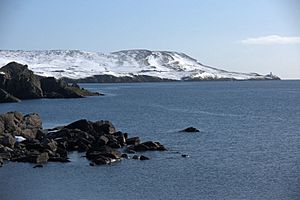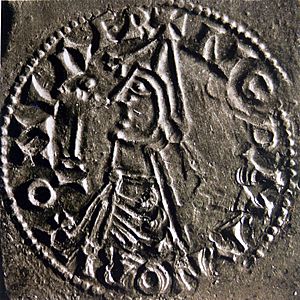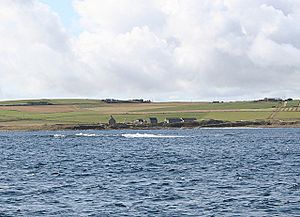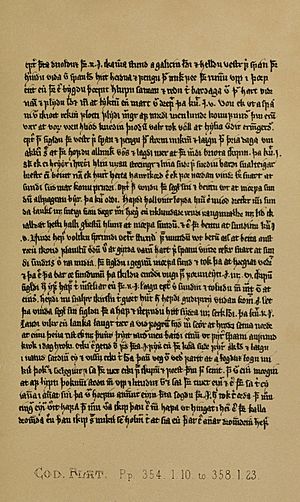Brusi Sigurdsson facts for kids
Quick facts for kids
Brusi Sigurdsson
|
|
|---|---|
| Earl of Orkney | |
| Title held | 1014 to the early 1030s, jointly with his three brothers |
| Predecessor | Sigurd Hlodvirsson |
| Successor | Thorfinn Sigurdsson |
| Died | before 1035 |
| Noble family | Norse Earls of Orkney |
| Spouse | Unknown |
| Issue | Rögnvald |
| Father | Sigurd Hlodvirsson |
| Mother | Unknown |
Brusi Sigurdsson (who died between 1030 and 1035) was an important leader in the Orkney Islands a long time ago. He was one of four sons of Sigurd Hlodvirsson, who was the Earl of Orkney. After his father died, Brusi became a joint Earl of Orkney in 1014, sharing power with his brothers. His story is told in an old Norse book called the Orkneyinga Saga, which tells the history of the Earls of Orkney.
Contents
Brusi's Family and Early Life
The Orkneyinga Saga tells us about Brusi's family. When his father, Earl Sigurd, was killed in a big battle called the Battle of Clontarf in 1014, his lands were split. The Norse earldom (the area ruled by an earl) was divided among his three oldest sons: Brusi, Sumarlidi, and Einar.
Their youngest brother, Thorfinn, was only five years old. He was being raised by his mother's father, Malcolm II of Scotland, in Scotland. Thorfinn received the earldom of Caithness in Scotland, which his father had also ruled.
The saga describes Brusi as "gentle, calm, modest, and a good speaker." Sumarlidi, the oldest brother, was similar to Brusi. However, Einar was very different. He was described as "tough and greedy, a strong and successful fighter."
Sharing the Rule of Orkney
Ruling with Sumarlidi and Einar

It was common for the Norse earldom of Orkney to have more than one earl ruling at the same time. Usually, one earl was seen as the main leader, especially for military actions. But these shared rules were often tricky and could lead to disagreements.
The Orkneyinga Saga doesn't say exactly how the lands were divided. It's possible Brusi's share, called the "northernmost part of the isles," included the islands north of the Orkney mainland. Einar might have had the eastern Mainland and the southern islands, and Sumarlidi the western Mainland.
Another idea is that Brusi's share was Shetland, which was part of the earldom back then. This makes sense because his son, Rögnvald, was later called "Lord of the Shetlanders." The island of Bressay in Shetland might even be named after Brusi. In a document from 1490, it was called Brwsøy, meaning "Brusi's island." This suggests it might have been his base in the 11th century.
Sumarlidi died peacefully not long after his father. Einar then took Sumarlidi's share, meaning he ruled two-thirds of the earldom. Brusi still held the remaining third. Einar quickly became unpopular. He demanded high taxes and a lot of military service from the farmers. He also didn't bring back much treasure from his raids. The saga says Einar was "a great bully," while Brusi was "well liked by everyone."
Ruling with Einar and Thorfinn
Thorfinn was "greedy and ambitious," much like Einar. When Thorfinn grew up, Brusi had to help them make peace, not just once, but twice. When Thorfinn became an adult, he asked Einar for the one-third share that had belonged to Sumarlidi. Einar refused. Both brothers gathered armies, so Brusi also gathered a force to stop them from fighting.
Brusi helped them create a peace agreement. It was decided that Thorfinn would get his one-third share. It was also agreed that if either Einar or Thorfinn died, the surviving brother would inherit their share. Thorfinn stayed in Caithness and had people manage his Orkney lands.
Once, Thorfinn sent a man named Thorkel Fosterer to collect taxes. But Einar forced Thorkel out of the islands and back to Caithness. Thorfinn told Thorkel to go to the court of King Olaf Haraldsson in Norway. Later, Thorfinn was also invited there. They returned together in the summer of 1020. They landed in Orkney, where Einar met them with a large armed group. Again, Brusi stepped in. They agreed that Einar and Thorkel would make peace and hold feasts for each other.

In October 1020, Einar went to Thorkel's hall at Hlaupandanes in Deerness. He was in a bad mood. On the last day of the feast, Thorkel was supposed to travel with Einar for the return feast. But Thorkel's spies reported that traps were set along the way. So, Thorkel delayed his departure. Einar waited for him by the fire in his great hall. Thorkel arrived secretly, walked into the hall with one of his men, and they killed Einar. Thorkel then escaped to Norway.
Ruling with Thorfinn
When Brusi inherited Einar's one-third share of the earldom, Thorfinn was not happy. He asked Brusi for half of the earldom. Brusi refused. Thorfinn could count on help from his grandfather, Máel Coluim mac Cináeda. But Brusi only had his own resources.
To find support, Brusi went to Norway to King Olaf's court. He wanted the king to decide how the earldom should be shared. Thorfinn followed him there. King Olaf made both of them accept him as their overlord (a higher ruler). He kept Einar's share for himself. He appointed Brusi to manage it. King Olaf also kept Brusi's two-year-old son, Rögnvald, at his court.
Brusi later gave control of Einar's third of the islands to Thorfinn. In return, Thorfinn agreed to defend Orkney and Shetland. The Heimskringla (another old Norse text) says that when King Olaf was defeated by Cnut the Great and had to go to Russia, Rögnvald Brusason joined him there. Rögnvald later fought in the Battle of Stiklestad in 1030, where King Olaf was killed.
The St Olaf's saga states that Brusi died sometime between King Olaf's death and before King Cnut's rule ended in 1035. The Orkneyinga saga says that Brusi had died before his son Rögnvald returned to Norway with Magnus the Good.
Who Ruled Next?
After Brusi died, Thorfinn ruled the earldom alone until 1036. Then, just like his father before him, Rögnvald became a joint earl. However, this partnership was not peaceful, and Rögnvald was killed around 1046. The Orkneyinga saga recorded that "everyone agrees that of all the Earls of Orkney he was the most popular and gifted, and his death was mourned by many." But it was Thorfinn's family line that continued to provide the earls for the next two and a half centuries.
 | Stephanie Wilson |
 | Charles Bolden |
 | Ronald McNair |
 | Frederick D. Gregory |



